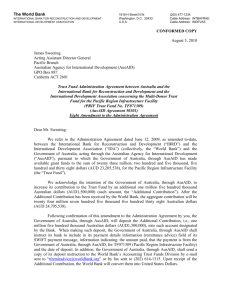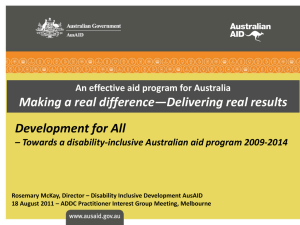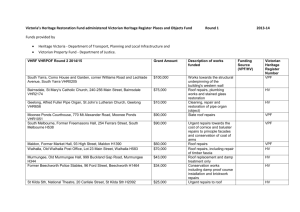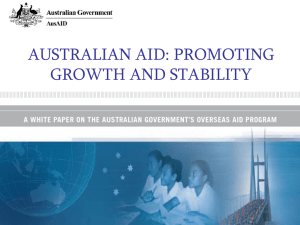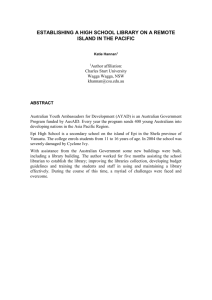Management Response Independent Review of the Vanuatu
advertisement
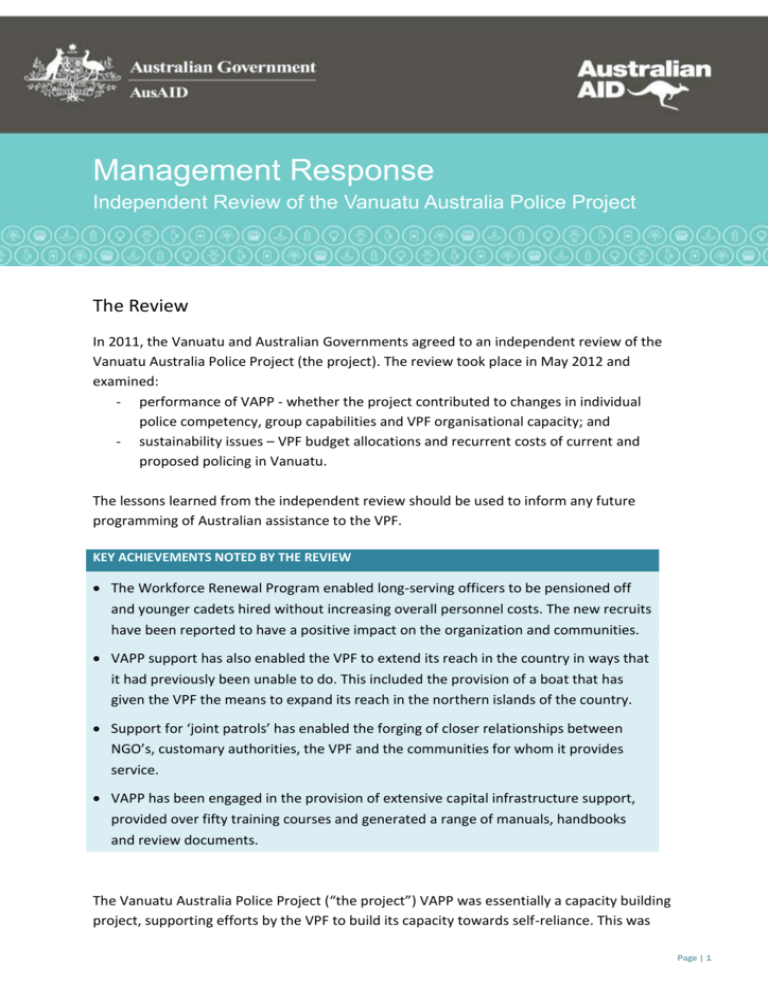
Management Response Independent Review of the Vanuatu Australia Police Project The Review In 2011, the Vanuatu and Australian Governments agreed to an independent review of the Vanuatu Australia Police Project (the project). The review took place in May 2012 and examined: - performance of VAPP - whether the project contributed to changes in individual police competency, group capabilities and VPF organisational capacity; and - sustainability issues – VPF budget allocations and recurrent costs of current and proposed policing in Vanuatu. The lessons learned from the independent review should be used to inform any future programming of Australian assistance to the VPF. KEY ACHIEVEMENTS NOTED BY THE REVIEW The Workforce Renewal Program enabled long-serving officers to be pensioned off and younger cadets hired without increasing overall personnel costs. The new recruits have been reported to have a positive impact on the organization and communities. VAPP support has also enabled the VPF to extend its reach in the country in ways that it had previously been unable to do. This included the provision of a boat that has given the VPF the means to expand its reach in the northern islands of the country. Support for ‘joint patrols’ has enabled the forging of closer relationships between NGO’s, customary authorities, the VPF and the communities for whom it provides service. VAPP has been engaged in the provision of extensive capital infrastructure support, provided over fifty training courses and generated a range of manuals, handbooks and review documents. The Vanuatu Australia Police Project (“the project”) VAPP was essentially a capacity building project, supporting efforts by the VPF to build its capacity towards self-reliance. This was Page | 1 done through the provision of long and short-term technical assistance, training, coaching and mentoring, study tours, and the provision of assistance in planning and maintaining infrastructure and equipment. VAPP was built on the previous program of support to the Vanuatu Police Force (VPF), the Vanuatu Police Force Capacity Building Project (VPFCBP), as a 16 month program running from February 2011 to June 2012 with AusAID-funding of AUD 9.9 million. The project was extended to 30 June 2013 with an additional AUD 6.75 million, following the AustraliaVanuatu Partnership for Development talks in August 2011 and at the request of the two governments. VAPP had a different modality to other policing projects in the Pacific in that it is managed and funded by AusAID and implemented by the Australian Federal Police (AFP). The review noted that the VAPP is the only Australian Government funded police development project directly supervised by AusAID. The review team strongly suggested that this program management model continue, echoing the findings of the ODE Evaluation of Australian Law and Justice Assistance. The review made several recommendations to strengthen the VAPP including increasing support to the Ministry of Internal Affairs (MoIA), the Government Ministry that oversees the VPF, conducting a needs analysis for training, and a re-focusing of the adviser roles. The review highlighted that although there was an extensive list of completed projects these did not appear to be strategic or progressively builds upon past accomplishments. Also, the VPF expressed a limited sense of ownership over the project and its activities. The review stressed the need for future policing programs in Vanuatu to be grounded in empirical data and to be flexible to evolve over time and prevailing circumstance. Page | 2 Recommendations and AusAID response The review made 3 short-term and 5 long-term substantive recommendations. It also made a number of specific recommendations in the body of the report. AusAID welcomes the review findings and agrees, or agrees in-principle, to all of the recommendations, which will be implemented on the resumption of the VAPP. Review recommendation AusAID response SHORT-TERM 1 2 3 Expand and deepen the workforce renewal program: This initiative increases the total VPF manpower and invigorates the organization with new recruits, who have been reported to have a positive impact on the organization and communities. Immediately prioritize VAPP activities with regard to the training college, CSU and Southern Command; reconsider the need for a dedicated position in Northern Command. By prioritizing, Australia will be able focus support on concrete and well-defined initiatives, and deliver measurable outcomes. Continue with Joint Patrols and review support to current policy of police post expansion. Agree. Agree; subject to negotiation with VAPP, VPF and MoIA. Agree. Joint Patrols should continue in the shortterm and will be considered as part of any new design of policing assistance to the VPF. The VAPP should and the VPF carry out a review of the police post expansion policy before any resumption of this activity. LONG-TERM 4 Pay increased attention to issues of language with particular reference to Bislama. 5 Develop a core set of indicators by which to measure the performance of the VAPP. 6 Pay increased attention to the Ministry of Internal Affairs. 7 Utilize existing empirical data and, as necessary, commission new research on prevailing crime trends in order to identify areas of greatest need. Commence research into relationship between VPF and customary authorities 8 Agree. AusAID can assist VAPP advisers with contacts to assist with language training prior to mobilisation and when in country. Agree. AusAID will work with VAPP on establishing a core set of indicators to measure the performance of the VAPP. Agree. The VAPP should undertake an assessment of the civilian oversight, and supporting role played by MoIA and where assistance is needed most. Agree. AusAID will sponsor a short-term study on prevailing crime trends prior to the design of any new policing program. Agree in principle. AusAID’s law and justice program will carry out research in early 2013. AusAID will look at the relevance of including questions on this issue as part of that research. Page | 3 Lessons Identified with Implications for Future Programmatic Direction The following lessons derived from the independent review of the VAPP are intended, by the reviewers, to be of use to all stakeholders as they discuss future programmatic direction for Australian policing assistance in Vanuatu. AusAID will consider all five lessons listed during the design of any future policing programmatic assistance to the VPF. 1. AusAID management exemplified in Vanuatu is the most appropriate model for Australia’s delivery of policing programs AusAID will recommend the use of this model as it provides some political distance for the AFP, particularly considering the events of 9 May 2012. This model of management also correlates with the findings of the ODE Evaluation of Australian Law and Justice Assistance. AusAID can provide links to other law and justice programs in Vanuatu, and take the lead in program development, and monitoring and evaluation. 2. Australian policing programs should always be grounded in empirical data AusAID and AFP should ensure that special attention is taken to the prevailing empirical evidence and devote resources to these means. 3. Design documents should cost out maintenance commitments AusAID and the project should ensure a comprehensive cost analysis is done for the provision of any capital infrastructure and equipment to be included in a new programmatic design. 4. Police development programs in Vanuatu should prioritize accountability and discipline VAPP will use the findings of the review of the Professional Standards Unit of the VPF, around discipline and accountability, to inform future work in this area. 5. Programs Need to Evolve with Time and Prevailing Circumstance AusAID is planning to conduct a PFM fiduciary risk assessment for the law and justice sector in Vanuatu, and this will include the Ministry of Internal Affairs. Following this assessment, AusAID will consider the use of partner Government systems as part of any new design. AusAID will consider the use of remote patrols in a future policing program design as a mechanism to strengthen relationships between the VPF, and chiefs and village elders, and in recognition of the goal in the emerging law and justice policy frameworks of both the Governments of Australia and Vanuatu of ensuring complementarity in the formal and traditional justice systems. Page | 4

